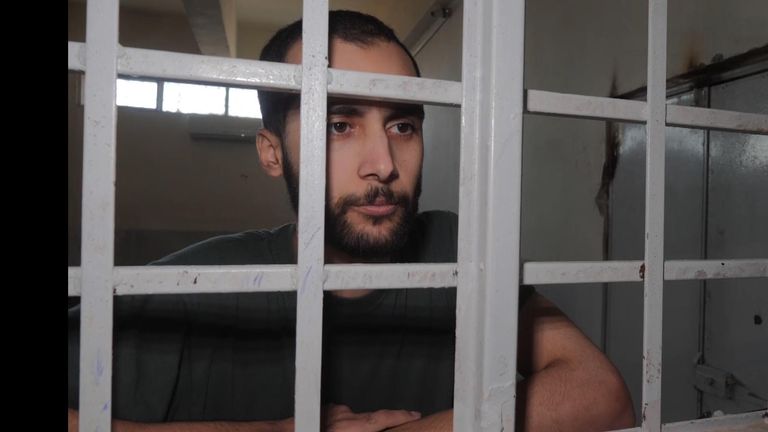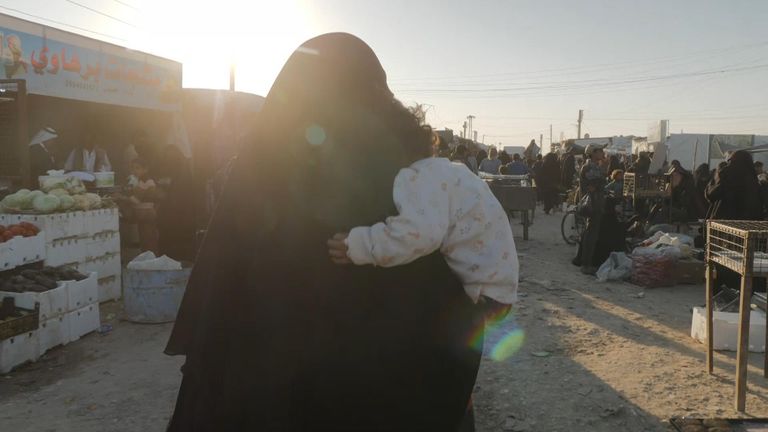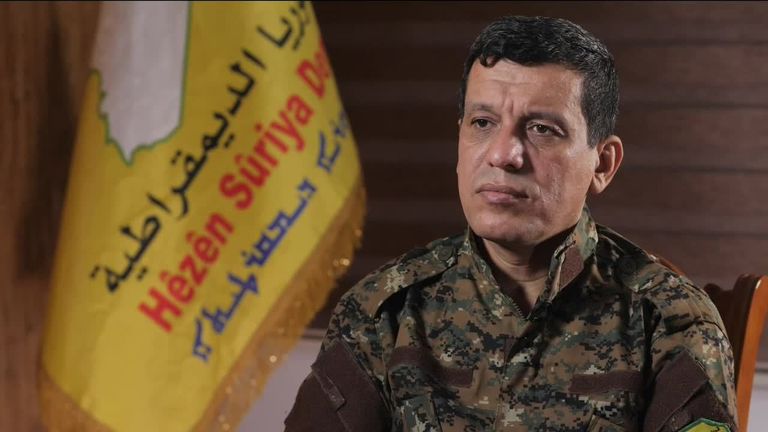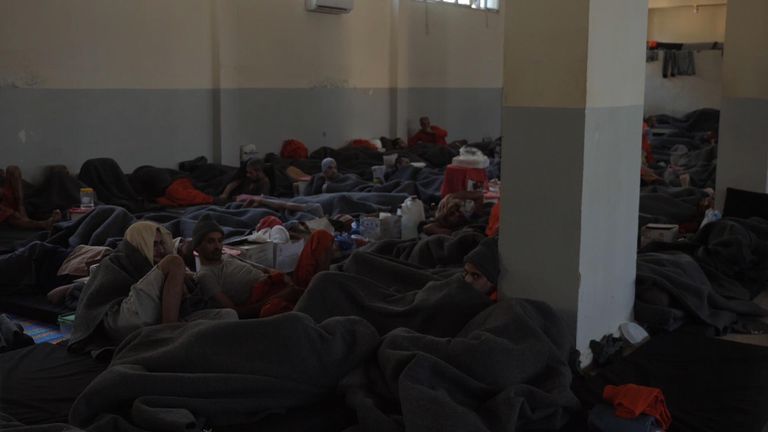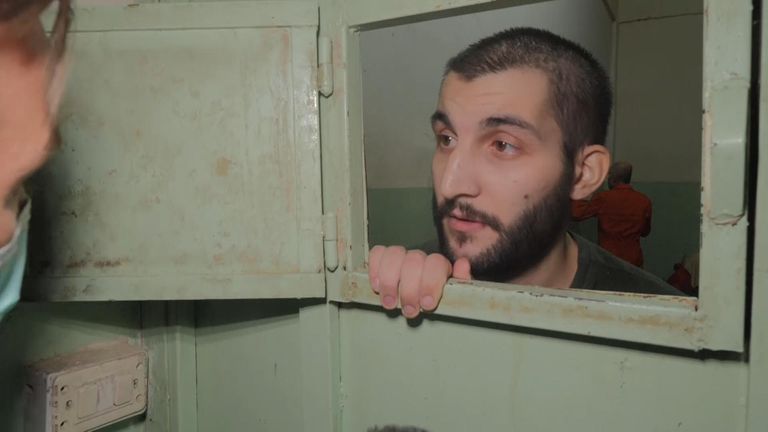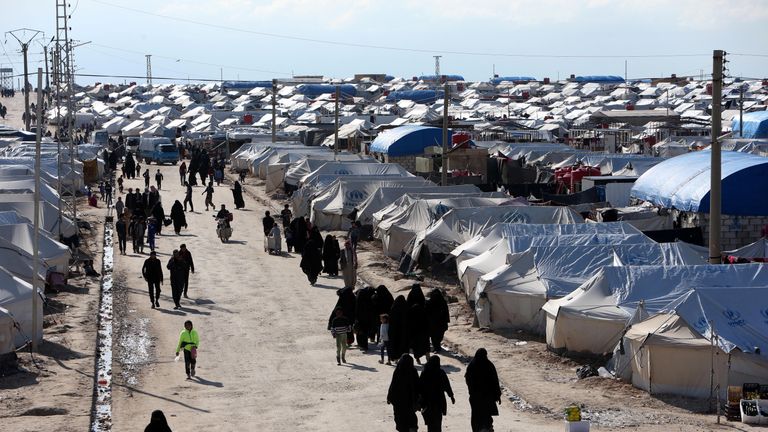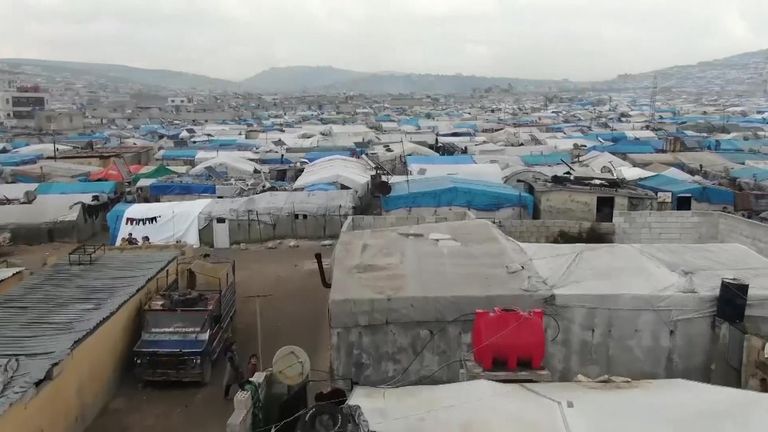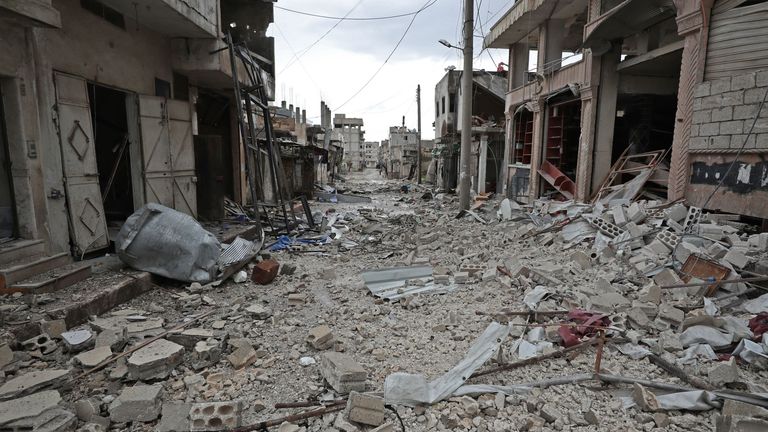A British student who travelled to Syria to join the Islamic State (IS) group has been killed in the prison where he was being held.
Sky News understands that Ishak Mostefaoui, 27, was killed during a disturbance at the al Sina’a prison in the northeastern Syrian town of Hasakah within the last two weeks.
Mostefaoui, from Leyton, east London, was interviewed by Sky News in November last year having been held in the prison since March 2019.
He had been detained with 5,000 other men, most of them foreign nationals, after the last IS stronghold in the town of Bagouz fell in March 2019.
In the interview, he told Sky News that he had been in Syria since “2013 or 2014”.
He was one of a number of students from the University of Westminster who had travelled to the Islamic State’s self-proclaimed caliphate.
The British government had, it is understood, stripped him of his British nationality because he is also a national of Algeria.
His family, who live in Leyton, moved to the UK from Algeria when he was five years old.
In line with many other Western countries, the UK government has refused to repatriate adult IS prisoners, arguing that they should be put on trial in Syria.
However, Kurdish authorities who control northeastern Syria have consistently said they do not have the capability to secure the jail.
Over the past few months there have been at least three riots and attempted prison breaks at the jail.
While the precise circumstances surrounding Mostefaoui’s death are not clear, it is understood that he died either during a riot or as part of an escape attempt.
Officers from the Metropolitan Police’s counter terrorism command had a file on Mostefaoui and had requested access to the Sky News interview with him.
In November, the top Kurdish commander in Syria told Sky News that another IS terrorist attack in a Western city is “expected” as a consequence of Western inaction and indifference in the region and unwillingness to take responsibility for their nationals.
General Mazloum Kobani, commander of the Syrian Democratic Forces (SDF), said: “The danger of the resurgence of IS is very big. And it’s a serious danger. I think there are many people who don’t know this but it’s true.
“We repeatedly told [Western governments] we have two choices for them: to take back their prisoners and put them on trial if they can do so. They have to honour their commitments.
“Or they set up an international court here [in Syria] because we cannot hold them forever here.”
The UK government has not commented officially, saying only: “Since 2011, the Foreign and Commonwealth Office has advised against all travel to Syria.
“Those who chose to leave the UK and fight for, or support, Daesh [the Islamic State] potentially pose a very serious national security risk.”
He approached the bars and introduced himself: ‘Ishak from Leyton in London’
Sky News Middle East correspondent Mark Stone on meeting the Londoner in al Sina’a prison.
He was the first inmate I met, emerging from a sea of orange boiler-suited men.
Ishak Mostefaoui had been beckoned forward by one of the prison guards. I was told he spoke English and would be happy to talk to me. It was November 2019.
He approached the bars and introduced himself: “Ishak from Leyton in London.”
I had not expected he would actually be British. We spoke for about five minutes.
His opening remark, in an east London accent, was a request: “Can I make a point about my face being shown? Can you just blur it out if you can?”
His death has put a focus back on an untenable situation that Western governments have tried to ignore.
“I came here [to Syria] in late 2013-2014,” he told me through the steel bars.
“You admit you joined the Islamic State?” I asked.
“I was within the Islamic State; under the Islamic State. Yeah,” he replied.
“At your own choice?”
“Yeah,” he said with a nonplussed tone.
Mostefaoui was one of about 5,000 prisoners in a ramshackle and insecure jail in the northeastern Syrian town of Hasakah.
The prison was established by the Kurdish authorities which control this part of Syria.
After the final battle with IS in the town of Bagouz in March 2019, surviving male fighters from 28 different countries were put in the prison.
They were nationals of countries who, by and large, chose to forget about them.
Rather than judging the prisoners with a due legal process, Western governments judged instead that it was politically impossible, legally impractical as well as risky to bring known IS fighters back to the countries they sought to destroy.
“Those who chose to leave the UK and fight for, or support, Daesh [IS] potentially pose a very serious national security risk,” a UK Foreign Office spokesman told us.
The British government argues that those detained in the region are ultimately in the custody of the relevant local authorities who are responsible for the detention facilities.
And so, since the spring of 2019, the prison has been the problem of Kurdish guards who have neither the numbers nor the capability to adequately secure the place.
More than that though, countries like the UK chose to disown the prisoners. Mostefaoui had his British nationality stripped from him.
It is illegal to make a person stateless, but Mostefaoui was born in Algeria. His family moved to the UK when he was five.
And so, legally, the UK was in a position to remove his British nationality because, they could argue, he was still technically an Algerian national.
On the face of it, there is logic to this. The argument goes that he chose to join an organisation – IS – which sought to destroy a Western, democratic, secular way of life.
Bringing men like Mostefaoui back to the UK for a trial would be fraught with legal complications. Successful prosecutions would be difficult because of a lack of permissible evidence.
The chances of cases collapsing, and suspects walking free, would be high. The subsequent costs and risks associated with monitoring them would be huge.
So leave them in Syria to be someone else’s problem? Well, as time has shown there are huge risks with this too. Some prisoners are known to have escaped. Mostefaoui is thought to have died in an attempted breakout.
It is also perfectly probable that they are not all perpetrators. Some may well be victims, duped by the cult. None of them have had their day in court.
There are no easy answers for all this. Every option is bad.
The same is the case for the foreign wives and children of these fighters. They number some 10,000 and languish in insecure camps not far from the jail.
A report released this month by the Centre for Global Policy warned: “Left undealt with, the challenge these children present runs a serious risk of developing from an easily solved welfare issue into a potential security and counter terrorism issue.
“It is in European countries’ short and long-term interests to take action on the children left behind in a region once held by the vanquished ‘caliphate’.
“Moreover, it is both ethically and legally a certain and necessary course of action. Under international law, children are the responsibility of their home countries, which need to address their future welfare and rehabilitation prospects.”
Mostefaoui had told me that he had a wife and two children who he said were killed in a coalition bombing. He said he had a second wife who survived but he was unsure where she had ended up.
He admitted he was “involved in fighting” but insisted: “We didn’t have anything to do with the [Western] coalition [fighting the Islamic State]; we don’t have a problem with the coalition. We didn’t have problems regarding that.
“We actually went to help out civilians in Hama, Homs, these areas and the Syrians over there were trying to push back the regime who were pressing as well.”
The prisoner told me he thought the Islamic State was now “over” and he did not believe in what it stands for because “they had done a lot of mistakes”.
He also insisted he was “not involved in that” when questioned about IS cutting off people’s heads off in Raqqa – its self-proclaimed capital city.
When I told Mostefaoui about recent attacks in the UK such as the Manchester Arena bombing and the London Bridge attack, he said he had not known about them, but condemned them.
Was he telling the truth? It is important to watch the interview, and hear his tone, for a more rounded judgement.
He is dead now. But many hundreds of others from countries all around the world are still there in a situation that is unsustainable.
Attempts by the Kurdish authorities to set up their own trials have been fraught with difficulties and complicated further by the coronavirus pandemic.
More will probably die and more will escape.
Last week’s attempted breakout, when we believe Mostefaoui was killed, was the latest of many.
The local security forces managed to contain it, but only just.

